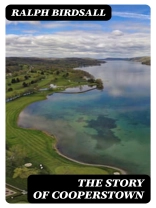In ‘The Story of Cooperstown, ‘ Ralph Birdsall intricately weaves together the rich tapestry of the village of Cooperstown, New York, exploring its historical origins and cultural significance. Through eloquent prose and a vivid narrative style, Birdsall immerses the reader in the local lore, hallmarks of American history, and pivotal moments that have shaped the identity of this quaint yet impactful community. The book serves not only as a historical account but also as a celebration of the American spirit, reflecting the broader literary context of regionalism and place-based narratives prevalent in early 20th-century American literature. Ralph Birdsall, a dedicated historian and passionate advocate for local heritage, draws on extensive research and personal insights rooted in his own deep connections to Cooperstown. His commitment to preserving the stories of this iconic location is reflective of his academic background in history and literature. Birdsall’s experiences and observations lend authenticity and warmth to his storytelling, making the history of Cooperstown resonate with both long-time residents and new visitors alike. ‘The Story of Cooperstown’ is a must-read for history enthusiasts, scholars, and anyone interested in understanding the intricate links between place and identity. Birdsall’s engaging narrative invites readers on a journey through time, urging them to appreciate the rich history and cultural legacy of Cooperstown—a small town with a profound impact on American culture.
关于作者
Ralph Birdsall, a distinguished historian and revere cleric, was known for his erudite exploration of American history with a focus on local narratives that illuminate the broader tapestry of the nation’s past. His notable work, ‘The Story of Cooperstown’ (1917), remains an essential reference for both scholars and enthusiasts of the village’s history, delving into the intricate details of its founding, cultural evolution, and significant contributions to broader American society. In this text, Birdsall meticulously cataloged the genesis of Cooperstown, New York, presenting a comprehensive account that began with the settlement by William Cooper in the late 18th century. His prose exhibited a careful balance between scholarly rigor and accessible storytelling, a hallmark of his literary style that made his historical examinations both informative and compelling. Although his bibliography may not be extensive, Birdsall’s influence is underscored by the lasting relevance of his work in historical circles, particularly those invested in understanding the nuances of rural American communities and their role in the country’s historical landscape. Birdsall’s scholarly approach and dedication to preserving and recounting the history of Cooperstown position him as an authoritative figure within the realm of American local history literature.












